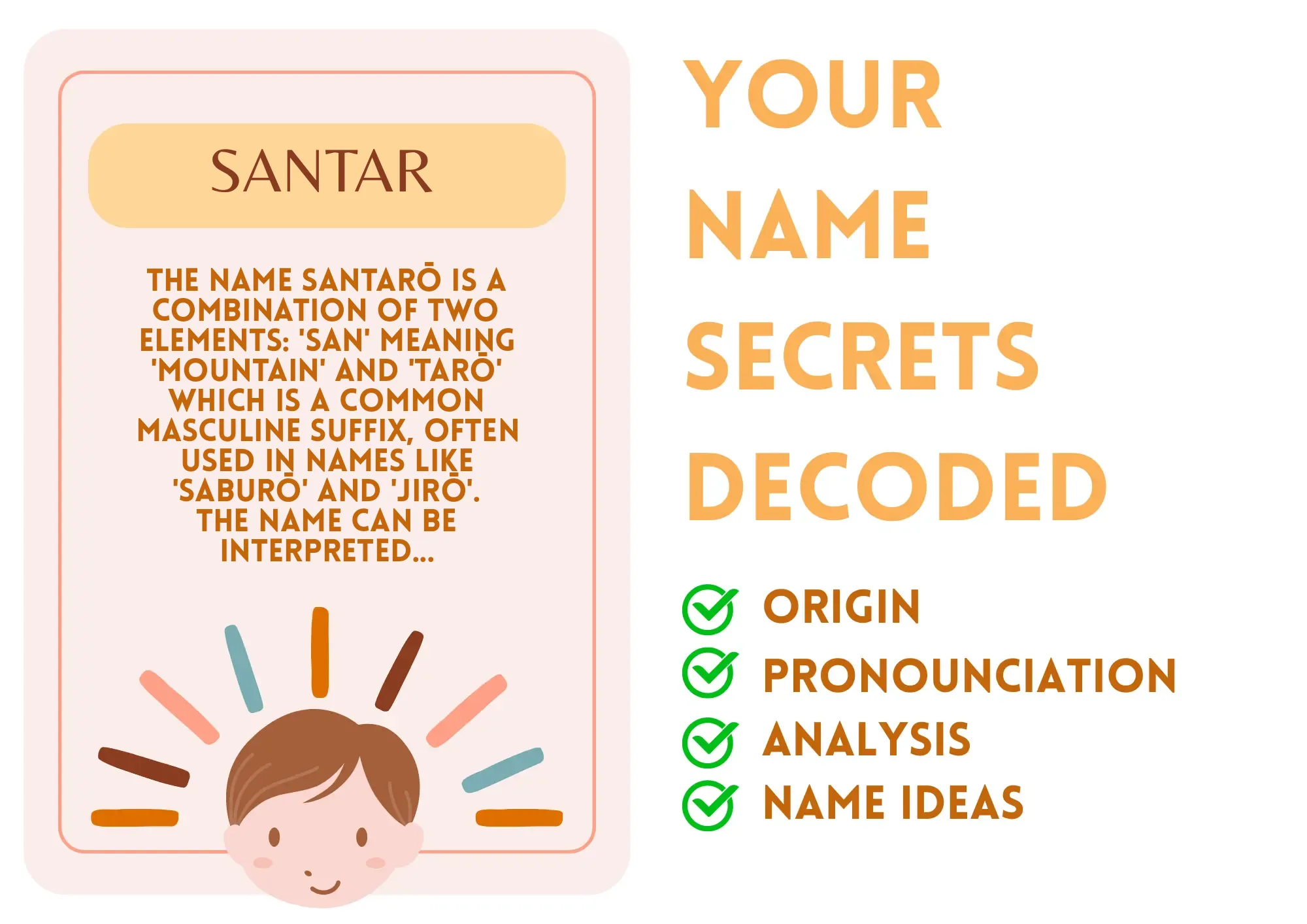
Santarō
Santarō is a Japanese name with a unique and meaningful sound. It combines elements of nature and strength, making it a choice that resonates with the Japanese cultural landscape. While not as common as other Japanese names, Santarō carries a sense of individuality and a connection to traditional values.
The name is generally perceived positively, evoking feelings of strength, nature, and a connection to the past. It is easy to pronounce and write, though some may find it slightly challenging due to its unique combination of sounds.
Santarō might be found in literature or historical narratives, but it is not as widely recognized in popular culture as some other Japanese names. Its uniqueness and cultural significance make it a choice that stands out and holds a special place in the Japanese naming tradition.
Basic Information
Gender: Boy
Sounds Like: San-ta-roh
Pronunciation Explanation: The name is pronounced with three syllables. The emphasis is on the first syllable, 'San', which is pronounced like 'san' in 'sand'. The second syllable, 'ta', is pronounced like 'ta' in 'table'. The third syllable, 'roh', is pronounced like 'row' in 'rowboat'.
Summary and Meaning
Meaning: The name Santarō is a combination of two elements: 'San' meaning 'mountain' and 'tarō' which is a common masculine suffix, often used in names like 'Saburō' and 'Jirō'. The name can be interpreted as 'Mountain Taro' or 'Taro of the Mountain'.
Origin: The name Santarō is of Japanese origin. It is a combination of the Japanese words 'san' (mountain) and 'tarō', a common masculine suffix.
Usage: Santarō is primarily a masculine name in Japanese culture.
Name Number (Chaldean)
Name Number (Pythagorean)
Popularity (Global Rank)
Overall: 718509
Boys:
Most Popular in
Religious and Cultural Significance
Religion: Shintoism and Buddhism
Background: The name Santarō holds significance in Japanese culture, particularly in relation to the natural world. Mountains are often seen as sacred and powerful in Shintoism and Buddhism, and the name evokes a sense of strength, resilience, and connection to nature.
Cultural Significance: The name Santarō reflects the importance of nature and traditional values in Japanese culture. It is a choice that suggests a strong and grounded individual, connected to the land and its history.
Historical Significance: The name Santarō has a historical connection to Japanese culture and naming traditions. The 'tarō' suffix has been used in Japanese names for centuries, and the name itself may have been used in historical narratives or literature.
Popular Culture
Literature and Mythology: While not as widely known as other Japanese names, Santarō might appear in historical literature or traditional stories related to mountains or nature.
Movies and Television: It is less likely to be found in popular movies or television shows, as it is a relatively uncommon name.
Feelings and Perceptions
Perception: Santarō is generally perceived positively, evoking feelings of strength, nature, and a connection to the past. It is seen as a unique and meaningful name, reflecting the values of Japanese culture.
Positive Feelings: Unique, strong, natural, grounded, traditional, connected to history, respectful, powerful.
Negative Feelings: Might be unfamiliar to some, pronunciation could be challenging initially.
Practical Considerations
Ease of Writing and Calling:
Common Typos and Misspellings: Santaro,Santaro,Santarou
Common Nicknames: San,Tarō,Santy
Santarō Popularity
Santarō Usage and Popularity By Country
| Country | Rank (Overall) |
|---|
Santarō Usage and Popularity By City
| City | Rank (Overall) |
|---|
Compatibility Analysis
Success Mantra for Santarō
Strive to reach your dreams.
Awaken the potential inside.
Never give up on your journey.
Transform challenges into triumphs.
Aspire to be your best self.
Rise above the obstacles.
Overcome fears with courage.
Alphabet Analysis for Santarō
Smart
Adventurous
Navigating
Thoughtfully
Artistic
Reliable
Outstanding
Acrostic Poetry for Santarō
Silly antics, laughter's delight
Adventurous spirit, ready for flight
Nurturing heart, like a warm sunny day
Tactful negotiator, come what may
Always joking, with puns that amuse
Radiant smile, never to lose
Oblivious at times, but always with charm
A Fun Roast for Santarō
So full of yourself, it’s a sight,
Always bragging, but never quite right,
Never knows when to shut it down,
Tossing out jokes that make us all frown,
Always the first to complain and whine,
Riding on praises that aren't even mine,
Oblivious to the truth, it's quite a crime.
A Love Poem for Santarō
Soft like the whispers of the morning breeze,
Alluring your laughter, it puts my soul at ease.
Nights spent in starlight, our bodies entwined,
Tender caresses and sweet words, designed.
All my dreams flourish when you’re by my side,
Radiating warmth, in you I confide.
One promise I make, in our love, we'll abide.
Famous Persons Named Santarō
Related Names
Similar Sounding Names:
Saburō,Jirō,Kenji,Taro